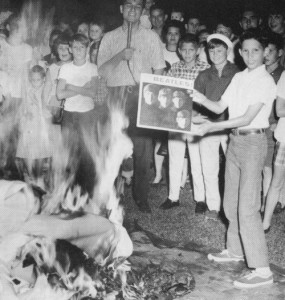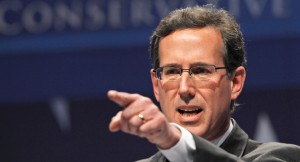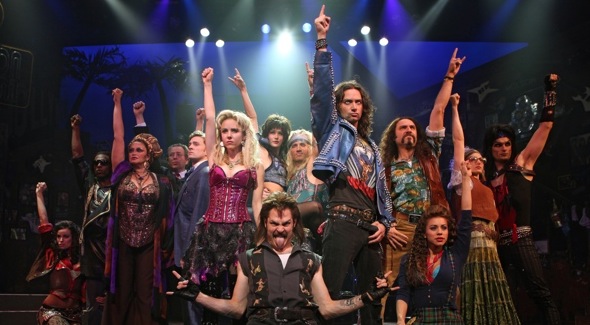If the upcoming movie adaptation of Rock of Ages is on your radar, then you’ve probably seen this trailer…
…and are at least familiar with the broad outline of the plot of the original stage musical:
Set in LA’s infamous Sunset Strip in 1987, Rock of Ages tells the story of Drew, a boy from South Detroit, and Sherrie, a small-town girl, both in LA to chase their dreams of making it big and falling in love. Rock of Ages takes you back to the times of big bands with big egos playing big guitar solos and sporting even bigger hair!
But you may not be aware of a major change in the plot: in the stage version (which I saw recently), the owners of the Bourbon Room rock club face off against greedy real estate developers who want to bulldoze the seedy Sunset Strip and replace it with “clean living.” As you can see in the trailer, these developers are replaced by a pack of Bible-thumping prudes who oppose the “sex, hateful music, and sex” of the Bourbon Lounge as epitomized by rock god Stacee Jaxx.
Lord, have mercy! What’s going on here? Why the change in villains, and pray tell me, what does it mean?
We Built This City on Rock and Roll
First, let’s unpack the conflict of the stage musical a little more. Is it a simple story of corporate greed run amok, similar to what we saw in The Muppets? Is it a simple story of the downtrodden 99% rising up against the 1%, similar to what we saw in Newsies? It’s actually neither. It’s really about the importance of urban planning.

We built this city on eminent domain seizures
No, seriously. Allow me to explain. In the brief synopsis above, I left out a couple of important details: 1) the developers are German and 2) they effectively bribe the mayor of Los Angeles to gain approval for their project and the eminent domain property seizures that spell doom for the Bourbon Room. As far as I know, their portrayal as Germans isn’t connected to any specific historical threat of German real estate developers (if they were going for an existential overseas threat from the 80’s, the Japanese would have been a more appropriate choice). Instead, it’s done to accentuate their “other-ness”: they’re not of the community and have no interest in understanding its values. They bring their predisposed ideas about what’s best for people (and what will make them rich). As for the significance of including the bribing of the mayor and the eminent domain property seizures in the stage show, they show how the political process that’s meant to protect local communities from bulldozers has been corrupted and circumvented by moneyed interests.
Imperious developers ignore local contexts, use their money to influence political support for their plans and steamroll opposition, and destroy unique local communities. I could go on all day about this, but instead, I’ll point you to the Wikipedia articles on Le Corbusier and Robert Moses and leave it at that.

Le Corbusier did not build his cities on rock and roll.
Back to what the Rock of Ages stage version is about: it’s about the importance of urban planning on a more micro level, but on a more macro level, it’s about the ability of hegemonic forces like deep-pocketed corporations and governments to squelch the artistic expression of unique local culture and replace it with stifling homogeneity under the guise of “economic development.”
So why exactly was all of this discarded for the movie version?
Sister Christian, Overtime Has Come
Based on the trailer, the movie tells a simpler story than the one I outlined above. Bible-thumping prudes hate rock ‘n’ roll. They don’t want people to party, to get laid, to play awesome rock music, or otherwise have a good time. These culture warriors have roots in the Tipper Gore-instigated Senate hearings on the subject matter of pop music, which led to the awesome sight of Dee Snider testifying before Congress:

He's not gonna take it...
Twenty years prior, Christian groups were burning Beatles records:

...no! He ain't gonna take it!
And on top of this cultural legacy of conservative opposition to the content of pop music, we have our current conservative culture warriors who generally oppose sex and having a good time:

...he's not gonna take it, anymore!
These are all good reasons for making the villain of Rock of Ages a Bible-thumping prude, but they don’t give us a reason for making the villain a Bible-thumping prude at the expense of the greedy developers and the message on cultural homogenization brought on by poor urban planning and corporate/government greed.
Perhaps the filmmakers thought that the culture war story would be more relatable and appealing to a 2012 audience than that of the greedy developers. The culture war has a more specific set of symbols, institutions, and leaders than the more amorphous concept of “greedy developers” and will therefore resonate more with viewers.
I mostly buy this justification, but I also can’t help but consider a more cynical motive: in becoming a major motion picture, Rock of Ages is now part of the “movie industry,” which is one of those corporate hegemonic forces that spreads stifling cultural homogeneity. When the moviemakers realized that this was at odds with the central conflict of the stage version, they rewrote the nature of the villain in a way that both removed this conflict and setup the movie industry as being on the same side of the scrappy Bourbon Room owners. Sure, Hollywood may be an agent of cultural homogeneity, but at least they want you to have sex and rock out. You know who wants to prevent you from having sex and rocking out? The Bible-thumping prudes.
Any Way You Want It
We’ll have to wait until June to see how exactly this new story gets told in the movie version, but until then, we can debate the finer points of urban planning, the culture wars, the hegemonic forces of stifling cultural homogenization, and monster guitar riffs.
So what do you think? Is the stage version really about bad development policies? Will the movie’s culture war theme resonate more with the audience than German real estate developers? And most importantly, why are we still taking it, when Twisted Sister said almost twenty years ago that we are most definitely not going to take it anymore?


I was so confused when I saw the Catherine Zeta-Jones tag. Is that her, as the Bible-prude?! I kinda think it must be. Wow.
Dee Snyder’s congressional testimony is one of my favorite things that has happened ever, let alone in the ’80s. I definitely don’t know if I buy this new villain, though. Conservative Christianity just wasn’t the same in the ’80s as it is today. I don’t even remember anything about Tipper being a Christian (although as the wife of a US politician, you kind of have to assume) – I remember all of that being done under the auspices of concerned parenting, something that *definitely* wouldn’t translate for today’s audiences, because now “concerned parenting” tends to mean “letting kids ingest whatever-the-hell media they want” mixed with a healthy dose of “bitching at their college professors when they make poor grades.” Parents expect kids to achieve as much as possible while living under as few restrictions as possible. I’m TRYING not to make a value judgment on the parenting style – I know I’m far from perfect myself, and honestly, I think there’s good in both eras – I’m just pointing out that people wouldn’t “get it.” So, it doesn’t sound like they’re harkening back to a (different) genuine threat, but making up something with modern cultural relevance.
ALSO, though – I haven’t seen the musical, but I assumed (and Wikipedia just confirmed) that it’s a “jukebox musical,” dependent on borrowed rather than original songs. I’m as big a fan of a corporate conspiracy as the next solidly independent voter, but I wonder if the issue here might be more one of rights acquisition (which is itself a big corporate problem, but still ) than wanting to avoid making rich developers look bad. Perhaps they just couldn’t get the right artists to sign off on the right songs for the film version, and they chose new songs and crafted a relevant plot to match? Just a thought.
Honestly, I never even checked this show out, because I had it confused with Jersey Boys (which I don’t have anything against, particularly, but…). If I’d known it was about hair metal, I would’ve been more interested! God, what am I admitting about myself?!
Yes, it’s CZJ as the Bible-thumping villain.
You’re right: The Tipper Gore-led movement that resulted in Dee Snider testifying before Congress wasn’t a religious crusade. But it’s worth pointing out that the director described the character as a cross between Tipper Gore and Anita Bryant, who was a religious crusader, albeit against homosexuality and not rock ‘n’ roll. That being said, I think it’s safe to put the Tipper Gore campaign in the same “culture wars” camp in that it was largely driven by a fear of sex.
ROA is in fact a “jukebox musical,” but I don’t think rights acquisition had much to do with this plot change. From what I can tell, the songs will remain largely the same. If anything, they’ll be expanded; the trailer mentions Def Leppard songs, which did not make it into the stage musical because they couldn’t get the rights at the time.
Hollywood is a corporate mouthpiece for the communist party. The populace has to be convinced that the govornment is god and worship its leaders. Just like North Korea. So to start with you have to demonize the church and seperate the people from god. That is why Hollywood has Christianity in its sights.
… what? Did Underthinking It start early this year?
Bible-thumpoing prudes against sex and partying… are you sure you aren’t talking about Footloose?
I know Journey is to blame for this, and this has been stated many times over I am sure, but there is no such place as South Detroit. There is a Downriver region which is south of Detroit. There used to be an East Detroit, but it changed its name to Eastpointe years ago to avoid being associated with Detroit, and possibly, to be associated with the many Grosse Pointe’s that are near Detroit, but are much more affluent. The city I used to live in tried the same trick, but was shot down.
Ha, my dad tells me that every time i listen to the song
“awesome site”?
Fixed, thanks.
Even though I haven’t seen the broadway show, I want to propose a third, and probably totally wrong, theory: Maybe they switched it to religious prudes, because then the good guys could “win” and the story would have a happier ending.
Of the two battles that rock n’ roll fought in the eighties, censorship and corporate greed, they really only survived the one against censorship. When was the last time you heard the religious right inveigh against the evils of Rock N Roll? Nowadays their main enemy is homosexuality. And I’m sure at some point in time there must have been at least one or two christian hair metal bands.
On the other hand, if you drive down the Sunset Strip these days, you’ll notice ( and since you’ll be stuck in traffic you’ll have plenty of time to notice) that the greedy corporate land developers definitely won. Sure some of the old clubs are still there, but they are surrounded by Starbucks, Vegas style themed bars like the Saddle Ranch, and super chic hotels/bars designed for the uber-rich and the uber-cool. I’m sure there’s still plenty of sex and drugs, but the rock n’ roll and the rock n’ roll attitude are most definitely gone.
Tipper Gore did not succeed in prohibiting raunchy or violent music and we can laugh about that weird period in US, but the corporate land use did succeed in turning the Sunset Strip into a soulless, corporate imitation of what it once was. Even if the particular bar of the story survived against the greedy landholders, the culture of the Strip definitely didn’t. So that even a happy ending will be kind of bittersweet. [much the same way that if you think about Roger Rabbit for a little while it makes you sad that in real life the car companies did succeed in destroying LA’s public transit]
Also, maybe this was switched when it became a movie because movies are most often made by people who live, or spend a lot of time, in LA. And the loss of that particular “local context” is particularly present for those of us who live near its ruins. What I’m suggesting is that for the (most likely) LA based writers and producers, dwelling on an instance of urban redevelopment that destroyed something truly unique was too much of a bummer to put in a movie that they wanted to be “fun”.”
I get the same bittersweet feeling at the end of ‘Braveheart’, knowing that Scotland would eventually, in effect, be taken over by England, and that the commoners (like William Wallace) would live largely at the whim of the nobles, whether Scottish or English, for at least 500 more years.
And I guarantee that all kinds of people would be making claims for One-Eyed Willie’s treasure after the end of “The Goonies”, so that the discoverers would spend all their findings on legal fees and settlements. The developers would eventually get the land, probably not for the country club but you just know they’re gonna build a “One-Eyed Willie’s Pirate Adventure” theme park. Mikey and Mouth will end up working there for minimum wage (Mikey returning to Oregon after graduating from Notre Dame, where he was inspiring but didn’t manage to learn any marketable skills; and Mouth after getting fired from every other job in town because of his…well…mouth).
And Sloth is going to move in with Chunk? How long will that last?
Bittersweet, indeed…
Considering the huge influx of christian rock and metal bands, I think the “bible thumping prude” thing is kinda out-dated. Sex? Maybe. Rocking out? I’ve seen kids at church headbanging harder than dudes at metal concerts.
Good point – e.g. http://www.youtube.com/watch?v=bvmYCgckjQg Callisto rock pretty hard.
I’m not all that familiar with this musical, but I’m wondering if they changed the villain so that the apparent double meaning of “Rock of Ages” might seem more fitting? I always assumed the musical had something to do with Jesus and/or Christians because of the title.